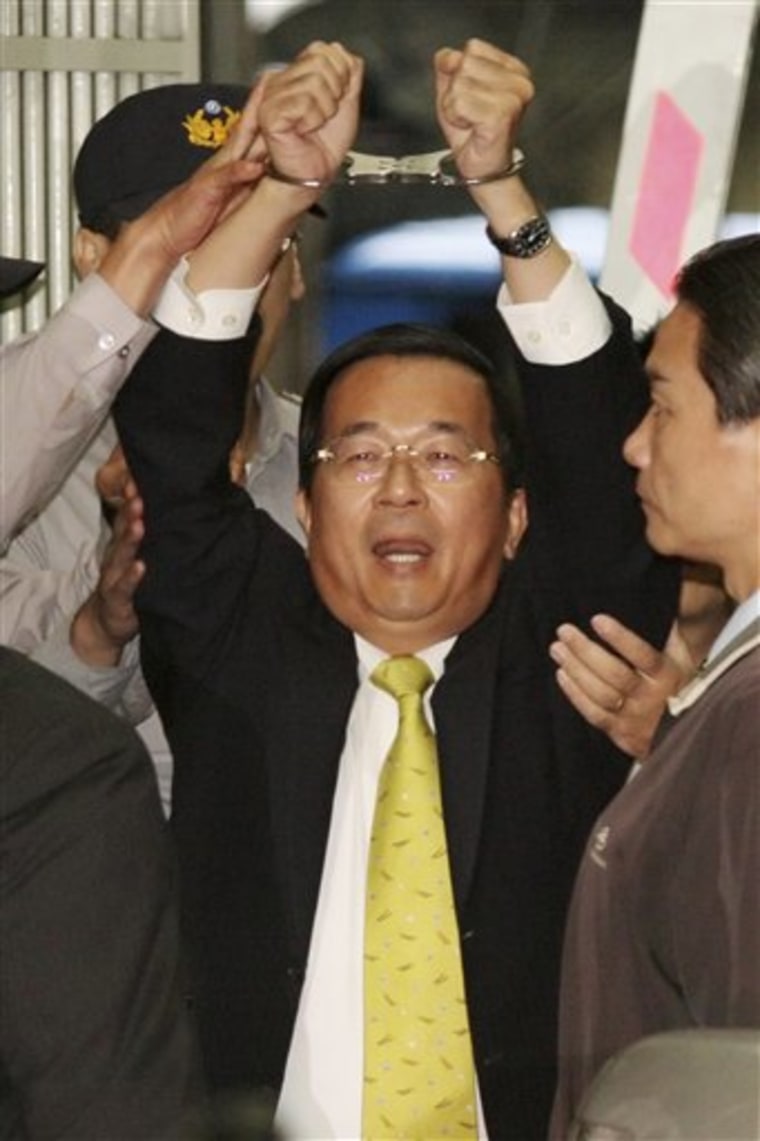A court ordered the detention of former President Chen Shui-bian on corruption charges Wednesday, marking an ignominious fall for the man who incensed China and roiled the United States with his contentious pro-independence policies.
Chen was expected to be sent to Tucheng Jail, the suburban Taipei facility where as a dissident leader 21 years ago he served eight months for defaming an official of the ruling Nationalist Party during the waning days of Taiwan's infamous martial law regime.
Under Taiwanese law, Chen can be detained for up to four months. His detention does not constitute a formal indictment.
Legal proceedings against Chen — including a prosecutorial interrogation — extended for nearly 21 hours from start to finish.
Interrupted by injury complaint
They were interrupted for several hours after the former leader complained that he had been injured while being transported from a prosecutors' office in downtown Taipei to the nearby court building.
He was returned to the court after doctors found he had sustained only a minor muscle tear that required no special treatment, said court spokesman Huang Chun-ming.
Wednesday's court order against Chen has implications far beyond Taiwan, where he is reviled by millions for his apparent toleration for corruption, but lionized by millions of others for his willingness to stand up to both Chinese threats and American opposition to his anti-China line.
Chen, who has denied any wrongdoing in the corruption case against him, is an ardent supporter of Taiwanese independence, a cause decried by Beijing, which insists that Taiwan is part of Chinese territory. China has threatened war if the island moves to make its 59-year break with the mainland permanent.
Chen has also earned repeated condemnation from the United States, Taiwan's most important foreign partner. Despite shifting its diplomatic recognition from Taipei to Beijing in 1979, Washington remains committed to helping the island defend itself against a Chinese attack. During Chen's just concluded presidency, it saw him as a loose cannon who could well provoke a Chinese invasion across the 100-mile-(160-kilometer)wide Taiwan Strait.
Denies policies are provocative
Chen himself denies any insinuation that his pro-independence policies are provocative.
He defiantly predicted his arrest late Monday, and then early Tuesday, attempted to link it to alleged attempts by newly installed Taiwanese President Ma Ying-jeou to placate China in the wake of violent protests last week against a visiting Chinese envoy.
"Long live Taiwanese democracy," Chen declared to his supporters outside the prosecutors' office in downtown Taipei. "Long live Taiwanese independence."
Not related to China
Li Yihu, a Taiwan expert at Peking University in Beijing said Chen's prosecution is not related to China in any way.
"It is a case involving a great amount of money and has had a negative influence, so it must be dealt with," he said. "It is nothing to do with placating the mainland."
Led from the prosecutors' office in handcuffs Tuesday afternoon en route to a waiting vehicle and the drive to Taipei District Court, Chen blamed the Ma administration for his troubles.
"This is a political persecution," he declared. "Cheers for Taiwan."
In sharp contrast to Chen, Ma has made reconciliation with China the centerpiece of his six-month-old administration.
Detention is latest chapter
Chen's detention is the latest chapter in a continuing corruption saga that badly undermined his authority during his last two years in office, and provoked mass demonstrations demanding his resignation.
Family and close advisers were imprisoned on a variety of graft charges, his wife went on trial for allegedly looting a special presidential fund, and Chen himself became the subject of a complex series of judicial probes.
His questioning Tuesday by a special team of prosecutors focused on allegations he laundered money and made illegal use of the special presidential fund during his eight years in office that ended in May.
In a dramatic television appearance in August Chen admitted that he broke the law by not fully disclosing campaign donations he had received, after a lawmaker from Ma's Nationalist Party alleged that Chen's son and daughter-in-law moved millions of dollars to Switzerland in 2007, and then forwarded the funds to the Cayman Islands.
Leftover donations or bribery?
At the time prosecutors said they wanted to determine whether the funds were indeed donations left over from political campaigns — as Chen insisted — or whether bribery might have been involved.
Under Taiwanese law, false declaration of donations is subject to a fine of $9,670, but money laundering carries a seven-year prison sentence.
Several Nationalist lawmakers have also alleged that the ex-president took large bribes in connection with a spate of mergers initiated by the government in 2005, when several small banks took over a number of well-established financial institutions.
Taiwanese newspapers have reported that Chen received millions of dollars in bribes from Taiwan's Far Eastern Group. Both the company and Chen have denied those reports.
